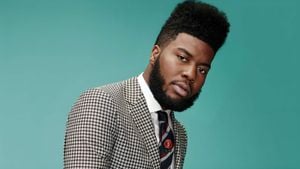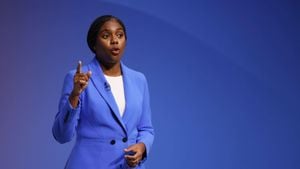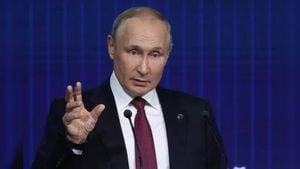Conservative attacks on free speech and academic freedom are gaining momentum across the United States, reflecting larger cultural skirmishes within the nation. This troubling trend, particularly prominent on college campuses, has sparked legal battles and policy changes aimed at reshaping higher education.
Recently, Indiana has taken center stage as part of this broader conflict. A federal judge ruled on August 14, 2024, to dismiss a lawsuit by four professors at Indiana University, who sought to block the enforcement of the state's new "intellectual diversity" law.
This law mandates public universities to assess tenure decisions based on whether faculty members promote free inquiry, expression, and intellectual diversity, though it lacks clear definitions. Critics argue the vague language creates unnecessary complications and risks academic self-censorship among professors.
The law emerged from concerns voiced by conservatives claiming they face discrimination in academic circles. Proponents of the law argue it fosters a campus environment where different viewpoints—especially conservative ones—are respected and welcomed.
Using the phrase "intellectual diversity" has become somewhat of code for conservative policymakers dissatisfied with perceived liberal biases on campus. This term suggests not the removal of oppressive silencing but rather the codification of specific perspectives deemed worthy of inclusion.
Indiana's vague definitions raise pressing questions. For example, if professors are required to present "varied scholarly perspectives," does it include denying the Holocaust or justifying slavery as beneficial to Black people?
These contentious issues highlight broader historical disputes around the nature of academia. While discussions of ideology often split along political lines, the battle over free speech transcends this binary, embroiling general principles of scholarly inquiry.
Judge Sarah Evans Barker claimed the professors had not yet suffered harm, indicating the policies implementing the law were not fully operational. Nonetheless, this leaves faculty members facing potential repercussions without definitive guidelines on how to navigate their professional responsibilities.
Shockingly, Indiana's Attorney General Todd Rokita contended the professors do not have sufficient First Amendment rights because their speech counts as government speech. This interpretation contradicts established court rulings affirming the supremacy of academic freedom at public universities.
The argument put forward by Rokita is not isolated to Indiana. Similar rhetoric has been echoed by officials across various states, particularly Florida, where restrictions have been implemented to regulate professors’ speech.
Governor Ron DeSantis has championed anti-education initiatives, most famously through the overhaul of New College of Florida, aiming to eliminate liberal ideologies. Under his guidance, the institution controversially discarded hundreds of books, signaling strong intent to control ideological directions within higher education.
Simultaneously, Ohio has allocated millions to fund "intellectual diversity centers" at state universities—a scenario critics believe will devolve these centers to mere platforms for conservative grievances. The state's hiring of Lee Strang, known for his anti-abortion activism, to head such initiatives highlights these fears.
The mission statements of these centers often sound benign but reveal undertones of conservative agenda-setting. For example, Strang maintains the center's purpose is to help students thrive as citizens of the Republic, but critics question whose voices are truly amplified within this framework.
Further complicate matters, other states like Idaho have enacted laws to limit university discussions around reproductive rights, showcasing how mounting conservative pressures extend beyond ideological debates within individual campuses. Laws such as Idaho's ban on taxpayer funds for abortion advocacy reflect growing local and national sentiments against reproductive freedoms.
Free speech debates often ignite heated discussions between various groups, with claims of censorship prevalent on both sides of the aisle. Organizations like Speech First claim to advocate for free speech yet simultaneously target what they term "toxic ideology"—primarily LGBTQ and diversity initiatives—on campuses.
Prominent cases—like Speech First, Inc. v. Cartwright—underline the challenges institutions face when attempting to balance fostering inclusivity with preserving free expression. Kevin Newsom, President Trump's appointee to the Eleventh Circuit, has defended right-wing speech claims, framing harmful rhetoric as necessary for comprehensive discourse.
Newsom's legal philosophy provides key insights because it suggests student advocacy for various stances should not face punitive measures. His progressive tendencies within conservative circles have prompted major discussions about the future of free speech policies.
Many feel this nuanced conversation benefits everyone—enabling all students to express their beliefs boldly. By defending the right of students to voice their opinions—regardless of content—first amendment rights may be expanded, benefiting all students, not just those with right-leaning views.
For example, recent rulings have indicated challenges to college speech policies may illuminate broader institutional constraints on campus. The stark reality remains: students should not fear repercussions for expressing unpopular viewpoints or engaging with controversial topics.
Even so, the battles often seem stacked against liberal ideas, situated under the guise of maintaining order and preventing division. The realities of public universities' financial and political pressures leave many wondering if these institutions can genuinely provide safe spaces for all ideas.
Throughout the United States, this ideological tug-of-war continues to impact academic environments. Schools are increasingly vulnerable to political ideologies dictations as conservative forces march forward under the banner of protecting free speech.
The debate over how free expression is both defined and regulated poses formidable challenges, as institutions grapple with aligning educational principles. Faculty members are often the frontline of this battle, forced to navigate unclear legal terrain amid increasing scrutiny.
The foundational aspect of free speech lies not just in advocating for comfortable discussions but engaging with all voices, including those we might disagree with. This dynamic necessitates thoughtful dialogue among students, educators, and administrators on college campuses.
While conservative claims for free speech garner significant visibility, the silence surrounding nuanced discussions on how institutions can uphold liberal ideals remains troubling. It raises the question: how can universities genuinely cultivate environments where diverse thoughts flourish without being ensnared by ideological pressures?
The essence of this debate highlights the diverse and often conflicting ideals present within educational circles today. With misinformation and debate often clouded by political rhetoric, there’s hope the importance of genuine, open dialogue remains at the forefront of academic discourse.
To navigate future legal landscapes effectively, universities may need to reevaluate their commitment to balancing ideologies rather than aligning entirely on one side of the aisle. By doing so, they might rediscover and fortify their mission as promoters of education for all.



